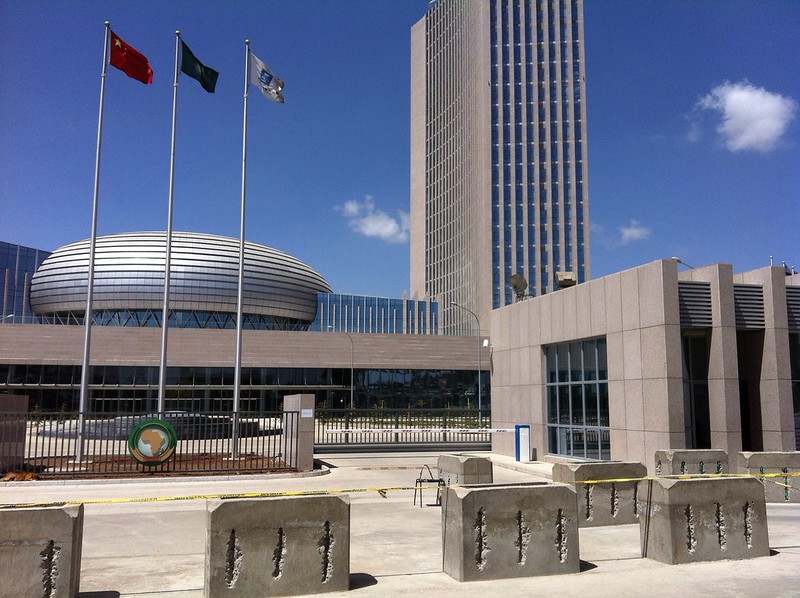 image courtesy: Hiroo Yamagata / Flickr
image courtesy: Hiroo Yamagata / Flickr
China’s Footprint in Southern Africa
It is no secret that China has made countries in Africa its next targets for international influence. With the implementation of the Belt and Road Infrastructure initiative (BRI), China has focused much of its efforts on the African continent. Due to the youth population increasing, the continent’s natural resource wealth, and the geographic scale involved, engagement with Africa is a principal focus for China. China has built at least 186 government buildings all over Africa, including the headquarters for the African Union (AU). This has security implications as China has been accused of spying on the AU numerous times with listening devices, and more recently, by hacking surveillance footage. The southern African region specifically has been at the forefront of influence from the Chinese government.
Infrastructure Development
China has infrastructure projects with every country in Africa with the exception of Eswatini. China builds these projects with predatory loans, or as “gifts” that comes with strings attached, known as debt-trap diplomacy. Several countries in southern Africa are not shy of accepting these infrastructure initiatives from China. According to the John Hopkins University China-Africa Research Initiative, it is estimated that Zimbabwe has signed over $3.0B in loans, South Africa about $3.9B, Zambia about $9.9B, and Angola about $42.6B. As examples of the projects undertaken, China is responsible for the China National Building Material Industrial Park in Zambia, Zimbabwe’s new parliament building, and Angola’s Caculo Cabaca Hydropower plant.
Media Influence
China’s propaganda or “xuanchuan” has a positive connotation to the Chinese government. It believes its information should be utilized for educating and shaping society. In Africa, China has been investing in local media outlets to promote its message. It has employed state-funded radio stations, TV, and social media outlets through its Xinhua News Agency, helping many southern Africa media companies out of financial difficulties. The African sector of the China Global Television Network and the China Daily have offices in Johannesburg and Nairobi, both of which are owned by the Chinese Communist Party. StarTimes, a Chinese electronics and media company, offers satellite and digital terrestrial television service to many villages that would not have access otherwise. The Chinese government also offers African journalists the opportunity to have training in mainland China. The issue is that these media companies and journalists become indebted to the Chinese government. Fighting Chinese media influence is tough when media companies use wires from the Xinhua News Agency, the Chinese government offers scholarships and training, and the Chinese government establishes its own media hubs on the continent.
Civil Society
Many Chinese people are migrating to southern African countries to invest in and employ cheap labor. Zambia has seen a dramatic change. A recent documentary by France 24, captures Chinese influence with the streets being covered with signs written in Mandarin. A Zambian taxi driver in the documentary emphasizes, “…it’s written in Chinese, the names, everywhere Chinese, so we are controlled by the Chinese.” Chinese farmers are creating their own farms in Zambia as they have less and less land to cultivate in China. They compete with the Zambian farmers by selling livestock at a much cheaper price. Zambian chicken sellers in the documentary state that their “chickens are very expensive. We are selling at a high price. They [Chinese farmers] are selling at a small price. We want the Chinese to go.” On the other hand, Antonio Mwanza, the spokesperson for the ruling party in Zambia, states “China is not taking anything away from Zambia. China has helped us more than the Western World . . . China is investing billions of dollars in our energy infrastructure, so China is giving us a better deal.” There is a clear disconnect between the Zambian government and civil society. Zambians aren’t the only ones with concerns. According to an Afrobarometer poll from 2020, favorable perceptions of China in 18 African countries fell from 65% to 60%, and 58% of citizens in these countries believed their governments had borrowed too much money from China.
Moving Forward
Zambia has been the first African state to default on its debt payments to China during the coronavirus pandemic. In turn, Zambia has begun discussions with the International Monetary Fund on an economic package that will assist the country in resolving its debt, presumably before the August Zambian elections. However, the Chinese government remains present in the southern African region, recently supplying masks and ventilators. The Biden Administration stated that there is going to be a new policy towards Africa, coming in “with fresh eyes.” The United States and other western nations can potentially leverage growing distrust of Chinese encroachment in order to weaken China’s sphere of influence on the continent.





